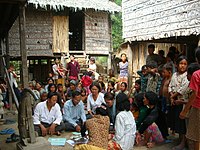Orality

Orality is basically the way people communicate and pass information to each other without writing it down. It means they use their mouths (and ears) to share stories, legends, histories, jokes, news, and everything else.
Let's imagine you have a fun fact about monkeys that you want to share with your friend, but you don't have a pen or a phone to write it down. You would then tell your friend the story directly, using your voice and your memory to transmit the message.
In the past, before writing and printing were invented, people relied heavily on orality to preserve their culture, traditions, and knowledge. They would gather around campfires, temples, or marketplaces to listen to storytellers, singers, or preachers who passed on their wisdom in the form of songs, poems, proverbs, or myths.
However, orality can also create challenges because information may get lost, altered or forgotten as it travels from one person to another. That's why sometimes stories or rumors can be different depending on who tells them or where they come from.
Today, even though we have many advanced technologies and ways to communicate (like books, social media, podcasts, etc.), orality remains an important aspect of human interaction. We still talk, sing, teach, and entertain each other with our voices, and that helps us to connect, understand, and learn from one another.
Let's imagine you have a fun fact about monkeys that you want to share with your friend, but you don't have a pen or a phone to write it down. You would then tell your friend the story directly, using your voice and your memory to transmit the message.
In the past, before writing and printing were invented, people relied heavily on orality to preserve their culture, traditions, and knowledge. They would gather around campfires, temples, or marketplaces to listen to storytellers, singers, or preachers who passed on their wisdom in the form of songs, poems, proverbs, or myths.
However, orality can also create challenges because information may get lost, altered or forgotten as it travels from one person to another. That's why sometimes stories or rumors can be different depending on who tells them or where they come from.
Today, even though we have many advanced technologies and ways to communicate (like books, social media, podcasts, etc.), orality remains an important aspect of human interaction. We still talk, sing, teach, and entertain each other with our voices, and that helps us to connect, understand, and learn from one another.
Related topics others have asked about:
